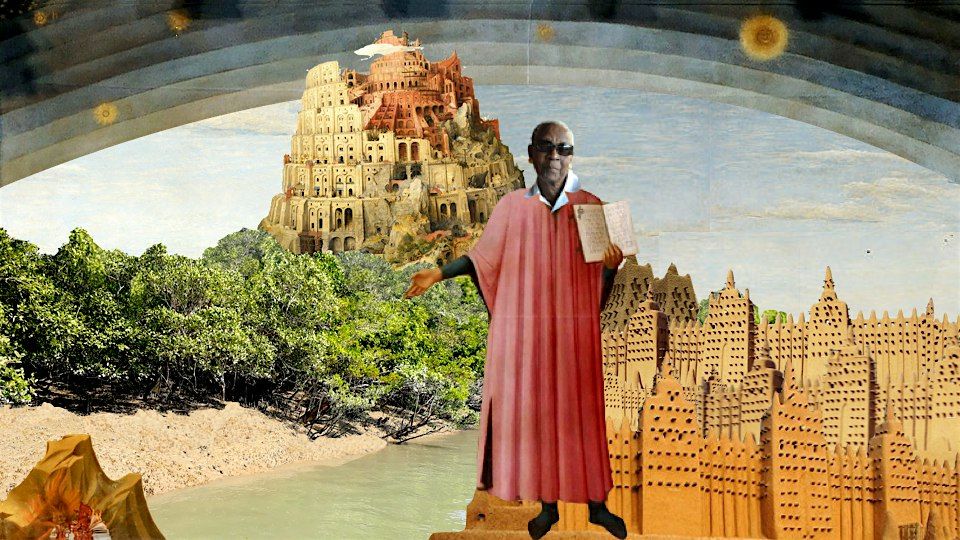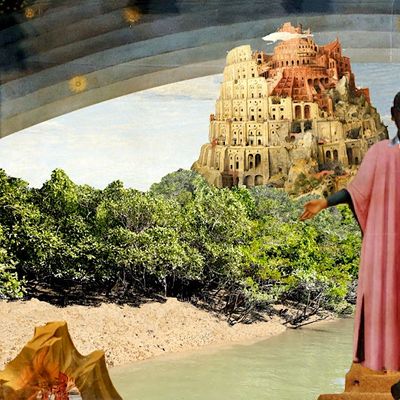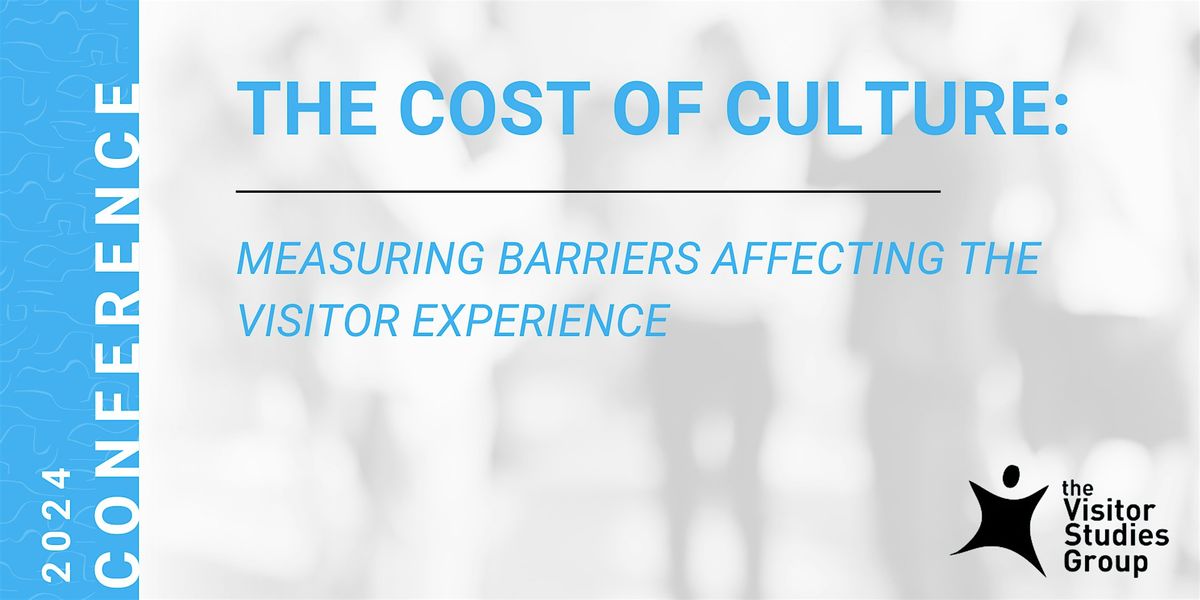
About this Event
<h4>
</h4>
Maryse Condé and Caribbean Crossings, 10 May 2024
</h4>
(Veuillez voir ci-dessous pour la version française)
Maryse Condé is the Caribbean island of Guadeloupe’s most fêted author, and one of the French-speaking world’s greatest writers. Nominated in 2023 for the International Booker Prize, Maryse Condé has previously won the Grand Prix Littéraire de la Femme (1986), the Prix Anaïs Nin de l’Académie Francaise (1988), the Puterbaugh Prize (1993), the New Academy Prize in Literature (2018), and the Grand Cross National Order of Merit from President Emmanuel Macron (2020). Having lived and taught in the Caribbean, as well as in post-independence Guinea, Ghana and Senegal, before taking a position at Columbia University in the USA, Maryse Condé has written novels, plays, short stories, children’s books, memoirs and essays that criss-cross the Caribbean and the Black diaspora.
This conference, Maryse Condé and Caribbean Crossings, will examine how crossings manifest themselves not only geographically, but in multiple intersecting ways in Maryse Condé’s works. The conference will also honour her remarkable oeuvre by exploring its interconnections with, and impact on Caribbean literature, theatre and thought more broadly. Just one example of Condé’s extraordinary impact in the Caribbean is provided by the echoes of her writings found in the theatres of Ina Césaire, Simone Schwarz-Bart, Gerty Dambury and Suzanne Dracius.
Migration and exile in all directions along the triangular trans-Atlantic route – between Africa, the Caribbean and South America, between the Americas and Africa, between the Caribbean and Europe, between Europe and Africa – feature in Windward Heights (1995), The Belle Créole (2001), and Condé’s most celebrated duet of novels, Segu (1984, 1985). In The Story of the Cannibal Woman (2003), Rosélie, estranged from her native Guadeloupe, is stranded in Cape Town after living in Paris, New York and Japan with her English husband, and in West Africa with her former fiancé. But journeys in Condé’s imaginary are more than merely spatial. In I, Tituba, Black Witch of Salem (1986), Man Yaya tells her young ward that the dead are ‘here, all around us, eager for attention, eager for affection.’ Visitations to the living by ancestors and parents – we think of Thécla Traoré in Waiting for the Waters to Rise (2010) – feature extensively across Condé’s works. These ghosts or spirits represent haunting, as Condé’s intersecting, doubled, spectral stories illustrate how the past – histories of enslavement, the Middle Passage, colonial occupation, racial discrimination, bereavement, filial alienation – resurface in successive generations. Interaction between spirits and the living is facilitated in novels such as Segu thanks to animist sensibilities, prevalent on the African continent and brought by enslaved people to the Caribbean. These belief systems establish connections between the sacred and the secular, thought and nature, animate and inanimate worlds, providing characters with insights and solace.
As traditional African cosmologies in Segu compete with Christianity and Islam, characters are caught in the crossfire of history, their various faiths, cultures and practices mingling, clashing or rubbing along. Hybridity, nomadism, métissage, creolity, multiculturalism and plurality, most notably exemplified in her latest work, The Gospel According to the New World (2023) are terms frequently ascribed to the universes created by Condé’s writings. They explore syncretism both on national and global scales, in linguistic and cultural spheres, and on a personal level, where power dynamics play out between characters of different ‘races’, classes and genders. Tituba describes how her white mistress Susanna Endicott speaks about her to her friends as if she were absent; in the novel-memoir Victoire (2008) where, as in many of Condé’s works, mothers and grandmothers play key roles, the eponymous protagonist silences herself in the presence of the new Black bourgeoise, but lets her spectacularly inventive cook speak and blend flavours, aromas and traditions. Shifting identities challenge sectarianism in The Story of the Cannibal Woman, as Rosélie pushes through interracial suspicion and mutual distrust between different Black communities in post-Apartheid South Africa.
Condé is an undisputed intellectual heavyweight, whose historical knowledge and literary eminence are evident across her writing. Intertextual references to Emily Brontë’s Wuthering Heights are apparent in Windward Heights; Mary Shelley’s Frankenstein, along with Aimé Césaire’s Sun Cut Throat, resonate in Who Slashed Celanire’s Throat (2000). But Condé combines her postcolonial revision of canonical works with more popular literary forms. Desirada (1997) is a page-turner in which Marie-Noëlle, abandoned as a child and living in a Parisian suburb, must negotiate the secrets and lies inherited from her mother and grandmother; The Story of the Cannibal Woman is a M**der-mystery; and Heremakhonon (1976) is filled with slang and profanities. Condé’s fiction lies at the aesthetic crossroads not only between the haut style of the French literary tradition and popular fiction, and between historical narration and fictional fabulation, but also between the intimately poetic and the cinematically epic, while navigating the choppy waters, at times courting controversy, between Caribbean artistic and activist movements like négritude, antillanité or créolité. As she expresses in her essay ‘Order, Disorder, Freedom, and the West Indian Writer’ (1993), she favours the fluidity of interconnections over the fixity of identity.
The notion of ‘crossing’, which features in the title of one of Condé’s novels, Crossing the Mangrove (1989), will guide enquiries and debates over the course of our conference. Examining how Condé’s works move across and between different aesthetic, linguistic, cultural, geographical, historical and ontological sites, this conference welcomes contributions on all Caribbean literatures in the expanded sense – including theatre and performance – in French, English, Spanish and Creole.
Maryse Condé – Traversées caribéennes, 10 mai 2024
Maryse Condé est l’auteure la plus fêtée de l’île de la Guadeloupe, et l’une des plus grandes écrivaines du monde francophone. Nominée en 2023 pour l’International Booker Prize, Maryse Condé a précédemment remporté le Grand Prix Littéraire de la Femme (1986), le Prix Anaïs Nin de l’Académie Française (1988), le Prix Puterbaugh (1993), le Prix de la Nouvelle Académie de Littérature (2018), et reçu la Grand-Croix Nationale de l’Ordre du Mérite du Président Emmanuel Macron (2020). Avant d’occuper un poste à l’université de Columbia aux États-Unis. Maryse Condé a vécu et enseigné aux Caraïbes, ainsi qu’en Guinée, au Ghana et au Sénégal dans les années qui ont suivi leur indépendance. Durant tout ce temps, elle a écrit des romans, des pièces de théâtre, des nouvelles, des livres pour enfants, des mémoires et des essais, qui sillonnent les Caraïbes et la diaspora noire.
Ce symposium, Maryse Condé – traversées caribéennes, s’attachera à montrer comment les traversées se manifestent non seulement géographiquement, mais encore de multiples manières, dans l’écriture de Maryse Condé. Le symposium rendra également hommage à son œuvre remarquable en examinant son impact sur la littérature, le théâtre et la pensée caribéenne au sens large. Pour ne donner qu’un exemple, on trouve des échos de ses écrits dans les théâtres d’Ina Césaire, de Simone Schwarz-Bart, de Gerty Dambury et de Suzanne Dracius.
Tout au long de la route triangulaire transatlantique, et quel que soit le sens – entre l’Afrique, les Caraïbes et l’Amérique du Sud, entre les Amériques et l’Afrique, entre les Caraïbes et l’Europe, entre l’Europe et l’Afrique – la migration et l’exil figurent dans l’œuvre condéen, par exemple dans La Migration des cœurs (1995), La Belle Créole(2001) et son roman le plus célèbre, Ségou (1984, 1985). Dans L’Histoire de la femme cannibale (2003), Rosélie, séparée de sa Guadeloupe natale, se retrouve au Cap en Afrique du Sud après avoir vécu à Paris, à New York et au Japon avec son mari anglais, et en Afrique occidental avec son ancien fiancé. Mais les voyages dans l’imaginaire de Condé ne sont pas seulement spatiaux. Dans Moi, Tituba sorcière noire de Salem (1986), Man Yaya dit à sa jeune pupille que les morts sont tout autour d’elles, « avides d’attention, avides d’affection ». Les visites des ancêtres ou des parents – nous songeons à Thécla Traoré dans En attendant la montée des eaux (2010) – aux vivants, sont omniprésentes, les fantômes ou les esprits représentant la hantise, les histoires croisées, doublées. Cette spectralité illustre la façon dont le passé – les histoires de l’esclavage, du passage du milieu, de l’occupation coloniale, de la discrimination raciale, du deuil, de l’aliénation filiale – revient dans les générations successives. L’interaction entre les esprits et les vivants est facilitée dans des romans tels que Ségou grâce aux sensibilités animistes, apportées du continent africain aux Caraïbes par les êftres réduites en esclavage. Ces systèmes de croyance établissent des liens entre le sacré et le profane, la pensée et la nature, les mondes animés et inanimés, apportent aux personnages dans l’œuvre de Condé bienveillance et compassion.
Dans Ségou, les cosmologies africaines traditionnelles rivalisent avec le christianisme et l’islam, les personnages sont pris entre deux feux, leurs diverses croyances, cultures et pratiques se mêlant ou s’affrontant. Hybridité, nomadisme, métissage, créolité, multiculturalisme et pluralité, illustrés notamment dans son dernier ouvrage, L’Évangile du Nouveau Monde (2023), sont des termes fréquemment attribués aux univers créés par Condé. Celle-ci explore le syncrétisme à l’échelle tant nationale et mondiale, dans les sphères linguistiques et culturelles ; que personnelle, la dynamique de pouvoir se jouant entre des personnages de « races », de classes et de genres différents. Tituba décrit comment sa maîtresse blanche Susanna Endicott parle d’elle à ses amies comme si elle était absente ; dans le roman-mémoire Victoire(2008) où, comme dans de nombreuses œuvres de Condé, les mères et les grands-mères jouent un rôle clé, la protagoniste éponyme se tait en présence de la nouvelle bourgeoisie noire, mais laisse sa cuisinière particulièrement inventive parler et mélanger les saveurs, arômes et traditions. Dans L’Histoire de la femme cannibaleles identités fluides remettent en cause le sectarisme, alors que Rosélie surmonte la suspicion interraciale et la méfiance mutuelle entre les différentes communautés noires dans l’Afrique du Sud post-apartheid.
Maryse Condé est une intellectuelle incontestée, dont les connaissances historiques et l’éminence littéraire sont évidentes. Des références intertextuelles aux Hauts de Hurlevent d’Emily Brontë sont visibles dans La Migration des cœurs ; Frankenstein de Mary Shelley, ainsi que Soleil cou coupé d’Aimé Césaire et d’Apollinaire, résonnent dans Célinaire cou-coupé (2000). Mais Condé combine sa révision postcoloniale des œuvres canoniques avec des formes plus populaires. Desirada (1997) est un roman à suspense dans lequel Marie-Noëlle, abandonnée enfant et vivant en banlieue parisienne, doit négocier les secrets et les mensonges hérités de sa mère et de sa grand-mère ; L’Histoire de la femme cannibale est un meurtre-mystère ; et Heremakhonon (1976) est rempli d’argot et de profanités. La fiction de Condé se situe à la croisée esthétique non seulement entre le haut style de la tradition française et la fiction populaire, ainsi qu’entre la narration historique et la fabulation, mais aussi entre le poétique intime et l’épique cinématographique, tout en naviguant dans les eaux troubles, et en suscitant parfois la polémique, des mouvements artistiques et activistes caribéens tels que la négritude, l’antillanité ou la créolité. Comme elle l’exprime dans son essai « Order, Disorder, Freedom, and the West Indian Writer » (1993), elle préfère la fluidité des interconnexions à la fixité de l’identité.
La notion de « traversée », qui figure dans le titre de l’un des romans de Condé, Traversée de la mangrove(1989), guidera les recherches et les débats au cours de notre symposium. Afin d’examiner comment les œuvres de Condé se déplacent à travers et entre différents sites esthétiques, linguistiques, culturels, géographiques, historiques et ontologiques, nous accueillerons des contributions sur la littérature caribéenne au sens large – y compris le théâtre et la performance – en français, en anglais, en espagnol et en créole.
Event Venue & Nearby Stays
Richard Hoggart Building, Room 137A, Goldsmiths University of London, Lewisham Way, London, United Kingdom
GBP 0.00












